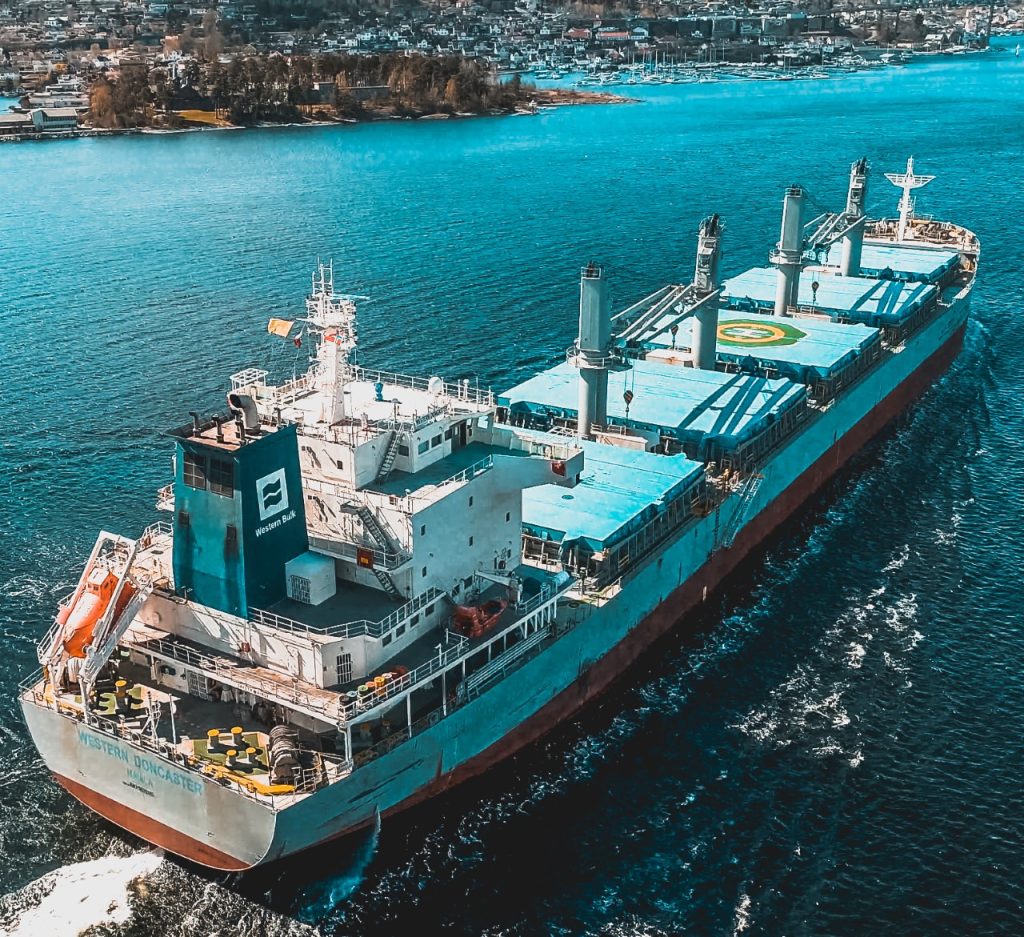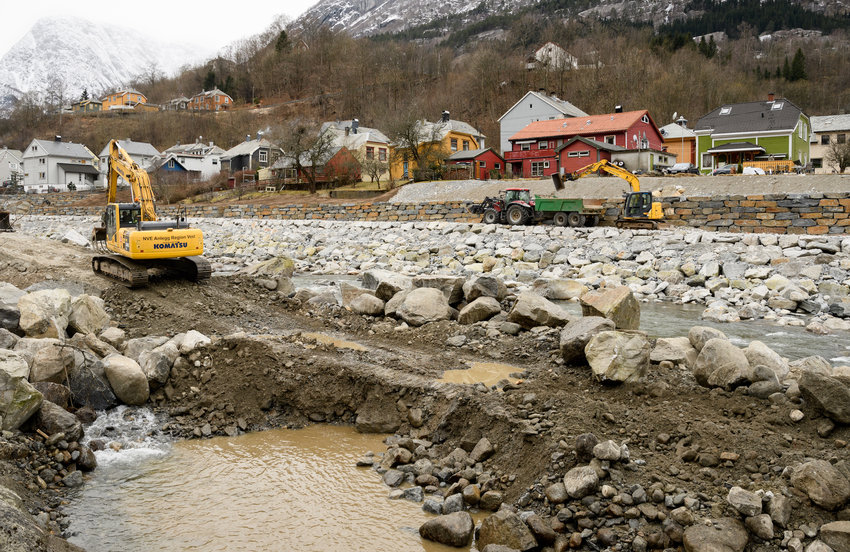Western Bulk is one of Climate Futures’ partners in the Smart Shipping node. We talked with Egil Husby, Chief Strategy and Transformation Officer at Western Bulk, to learn more about the company and what they hope to get out of the cooperation with Climate Futures.

About Western Bulk
In short, Western Bulk transports commodities at sea from one port to another. With a fleet consisting of about 120 ships and customers all over the world, they visit several hundred different ports over the course of a year. Unlike many of their competitors, Western Bulk does not own its ships, but instead rents them from ship owners and focus exclusively on the transportation of commodities from A to B.
– Our customers are companies that either produce or consume commodities, for example, Norsk Hydro, which needs commodities for its aluminium plants in Norway. They can sign a contract with us, and we will transport alumina for example from Brazil to Norway, and thus we take responsibility for the whole process of loading in Brazil, carrying out the trip, and unloading in Norway.
For Western Bulk, it is all about making shipping as efficient as possible. They operate in two markets simultaneously: a market for shipping, where you sign new contracts to transport commodities, and another market for ships, where Western Bulk rents ships on short- and long-term contracts. The benefit of being in both markets is that they can build exposure to the shipping market if they for example think it will move in a certain direction.
– For example, if we think there will be high demand in the Atlantic Ocean, we can send boats from the Pacific to the Atlantic Ocean and thus make money on the price difference. There is a trading operation involved that entails exploiting the fact that the global market for ships and commodities is in constant motion, and it moves differently for different boats and commodities. That is the main business model here: to make money out of being smart in this market.
In addition to shipping, Western Bulk is a trading company. They move ships on demand and take loads in the so-called spot market. Furthermore, the company has contracts with certain clients, and these include regular shipping commitments over time.
– We can for example commit to transport one load a month for two years. Typically, we would also rent a ship for that same period to secure that commitment. However, that does not mean that we will use that ship to transport that specific cargo. We can for example decide to lease the ship to someone else and instead rent a different ship from the market to carry out the trip, if we find that more efficient. We continuously move boats around to where we think we will get paid more and take cargos in areas where we think we can get cheaper boats. That way, we constantly look for opportunities to optimise or squeeze out a margin by finding cargos we think pays well combined with cheap boats.
It is important to have sufficient local knowledge when you visit as many ports as Western Bulk does in a year. One needs to be familiar with the local conditions in the areas where you transport cargo. That way, you load the cargo onboard efficiently and can transport it and unload it safely. According to Husby, this is an important knowledge component.

Photo: Western Bulk
As mentioned, efficiency is important to Western Bulk. They are not a shipping company in the traditional sense because, as mentioned, they do not own any ships. But what does that mean?
– We are good at matching the right cargo with the right ships at the right time. By doing so, we contribute to increasing market efficiency by using the boats that are best suited for different kinds of shipping orders. Consequently, we reduce ballast time and increase the fleet’s efficiency, for example by making sure to use the boats that are closest to the cargo. This contributes to reducing emissions from the industry and you avoid wasting time on sailing without cargo.
One has to make many decisions along the way: how fast do you sail to get the best results? Should you sail around or through a storm? Where should you buy fuel? Do you need one or two tugboats in the port? These decisions help determine whether or not Western Bulk makes money on a cargo.
– We always must make more good than bad decisions to make money, and our employees make important decisions every day, decisions concerning everything from which contracts to choose to which boats to use or how fast to sail. You need to know how to handle bad weather and what to expect from a hurricane. Making these good decisions requires that you are always ahead on the knowledge curve. We cannot lean not how good results we got last year – this market is extremely dynamic, and things change all the time, both when it comes to which commodities go where, which customers are active, and which boat types are best suited. Weather is also one such important factor that is constantly changing, and that changes more now than it did previously. If we do not keep up with what is happening, we will gradually make worse decisions, so we are dependent on staying updated and running a bit faster than the competition at all times.
The Effect of Climate Change on the shipping-industry
Climate change leads to more extreme weather, which naturally affects an industry that is so vulnerable to weather and wind, and the shipping industry is already noticing both physical and economical consequences of this.
How exactly do you see that climate change affects the shipping industry?
– Back to when we are signing a contract with for example Hydro. Let’s say we do a three-year contract to transport alumina from Brazil to Norway. Most of the risk associated with delays due to weather is on us. If it rains a lot in the port you cannot necessarily load and unload, so you have to wait. If you encounter bad weather on the way, the trip takes longer, which costs money. We also use more fuel, which also costs money. Thus, there is a direct cost component associated with the weather getting more extreme and unpredictable. To be able to price the contracts correctly, we need to account for uncertainty associated with rain, changes in ocean currents, and other types of weather factors that affect us. Other examples of weather factors that are important, where you see more extreme and unstable patterns, are water flow in rivers like Mississippi in the US and Paraná in Argentina, as well as the monsoon season in south-Asia.
Another thing is that the risk of weather-related events like damages or accidents increases. Recently, we had 3-4 boats that were hit by Hurricane Ida in the US. Some boats were stuck in the river without being able to get to shore, others were delayed, loads were cancelled because the infrastructure on land was destroyed. This is a concrete example of how increased risk for extreme weather directly affects our business because it causes delays and damage to cargo, ships etc., which we have to handle.
Western Bulk was recently involved in a master’s thesis project with Climate Futures, which used historical weather data to estimate how the weather will be further into the future. Basing predictions on historical weather data will not necessarily be as easy in a changing climate with increasingly extreme weather.
Can you elaborate a bit on this issue?
– We use many models that are based on historical data. Regarding what was mentioned earlier about seasonal patterns: for example, when it comes to fuel consumption, which that thesis discussed, we use a weather factor that indicates how much extra fuel or time we will use to sail a certain distance at different times of the year. In winter, for example, a trip will take longer because the currents are stronger. However, our models are getting less accurate as the weather becomes more unstable, and we are dependent on better forecasts to build our models on, instead of historical data. Models based on historical data will probably get less relevant, and we will depend more on good forecasts that not only predict a week ahead but maybe a month or two.
Additionally, with the right conditions, the company can set a higher price because they can expect quick delivery without any delays or problems due to weather. This is another good example of how seasonal forecasts are important to plan regarding which boats to use, what cargo they should have, how long the trip is estimated to last, and how much fuel you expect to use.
– If the seasonal forecast indicates mild and dry weather in January and February in the Pacific Ocean, we can more confidently price the cargos that transport grain from the USA to China aggressively.
Cooperation with Climate Futures
How did you become aware of Climate Futures?
– That happened through a professor at NHH, Roar Ådland, with whom we have worked previously on other projects and have a good dialogue with. He needed partners on the shipping side, and it did not take long for us to answer that this was something we were interested in being a part of. There are two main reasons why we want to be a part of Climate Futures: the general reason is that we enjoy working with researchers. We cannot dig deep into every issue and working with researchers that are ahead on several different issues is very useful for us. In addition, we help them come up with relevant topics they can explore, while they simultaneously help us solve some of our challenges. I think this is a very exciting combination. Generally, we like to be a part of research when there is a relevant angle for us, and where we feel that we can contribute to the project.
Husby continues to explain that in this project specifically, they see that weather and climate are big risk factors that the company and the industry are facing. The shipping industry is definitely affected by the change in weather patterns and climate change in general, which makes it important to understand how it will affect Western Bulk in the future – what big trends are coming, which effects will they have on the market, and how can they adapt to be prepared to meet the challenges that this will lead to.
– We are not competent enough in this area, which is why being a part of Climate Futures and being able to utilise the knowledge involved in this kind of project is very useful.
How do you think Western Bulk can contribute to Climate Futures?
– For one thing, we have knowledge about how weather affects our industry, which can be valuable. A project like Climate Futures is concerned with research that is relevant to the industry, and that means that we have to come up with issues that are meaningful to us. I think that is our primary role.
What concrete results do you wish to see come out of the project?
– The first thing, which might be quite simple and maybe a bit short term, is pricing. We are constantly in the market for signing new contracts and cargos for customers, and we need to price them right. Knowing the risks makes us able to price our services more accurately. Weather is one risk factor, and we see that it is valuable for us to have better insight on how the weather will be in different places a bit further into the future. That can involve rain, ice, and several other variables that can affect the risk of going through with a trip, and we need to know how that risk evolves.
According to Husby, this is related to the fact that seasonal variations were previously relatively stable. You often know which months to expect heavy rains, or the monsoon which is quite fixed in certain periods, and it has “always” been that way. Now, however, we see that these patterns are more irregular and the uncertainty associated with the timing of the monsoon or rainy season is higher.
– This makes it harder to know when to move the ships around and how to price things, and we hope that our collaboration with Climate Futures will help us better understand how seasonal variation changes.
Furthermore, seasonal forecasts can contribute to better predictions that predict rainfall, wind, and ocean currents for a longer time period so we can plan further ahead. Husby also mentions that in the long run, it can be interesting to see how climate change affects the supply and demand of certain commodities.
– We make a living transporting commodities, and a lot of them are for example agricultural products. We see that climate change is affecting the trading pattern in this area. Some places get drier and maybe fewer products are produced in these areas, while in other areas the production might increase. We are therefore curious to know how climate change affects supply and demand.
Moreover, Husby mentions that by contributing to increase the efficiency of the shipping industry, they also help reduce emissions. Western Bulk constantly tries to make the right choices, and the most cost-effective choices are often the most climate-friendly.
– We contribute to reduce emissions when we help make the market more efficient, which I believe is a win-win situation. We make more money if there is less ballast time and if we can use our boats as much as possible for transporting cargo, which also reduces emissions. For us, it is also about looking at how climate change affects our everyday lives. Being a part of Climate Futures ensures that we are updated in this area as well and that we have access to the newest tools and the best knowledge. We hope this can be a competitive advantage.

